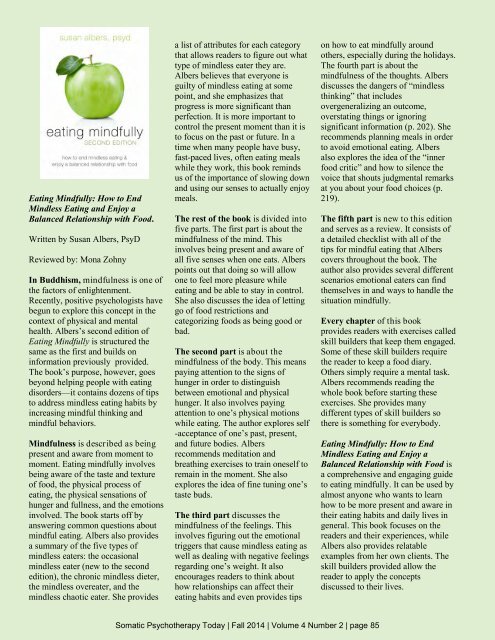SPT-Fall2014
SPT-Fall2014
SPT-Fall2014
Create successful ePaper yourself
Turn your PDF publications into a flip-book with our unique Google optimized e-Paper software.
Eating Mindfully: How to End<br />
Mindless Eating and Enjoy a<br />
Balanced Relationship with Food.<br />
Written by Susan Albers, PsyD<br />
Reviewed by: Mona Zohny<br />
In Buddhism, mindfulness is one of<br />
the factors of enlightenment.<br />
Recently, positive psychologists have<br />
begun to explore this concept in the<br />
context of physical and mental<br />
health. Albers’s second edition of<br />
Eating Mindfully is structured the<br />
same as the first and builds on<br />
information previously provided.<br />
The book’s purpose, however, goes<br />
beyond helping people with eating<br />
disorders—it contains dozens of tips<br />
to address mindless eating habits by<br />
increasing mindful thinking and<br />
mindful behaviors.<br />
Mindfulness is described as being<br />
present and aware from moment to<br />
moment. Eating mindfully involves<br />
being aware of the taste and texture<br />
of food, the physical process of<br />
eating, the physical sensations of<br />
hunger and fullness, and the emotions<br />
involved. The book starts off by<br />
answering common questions about<br />
mindful eating. Albers also provides<br />
a summary of the five types of<br />
mindless eaters: the occasional<br />
mindless eater (new to the second<br />
edition), the chronic mindless dieter,<br />
the mindless overeater, and the<br />
mindless chaotic eater. She provides<br />
a list of attributes for each category<br />
that allows readers to figure out what<br />
type of mindless eater they are.<br />
Albers believes that everyone is<br />
guilty of mindless eating at some<br />
point, and she emphasizes that<br />
progress is more significant than<br />
perfection. It is more important to<br />
control the present moment than it is<br />
to focus on the past or future. In a<br />
time when many people have busy,<br />
fast-paced lives, often eating meals<br />
while they work, this book reminds<br />
us of the importance of slowing down<br />
and using our senses to actually enjoy<br />
meals.<br />
The rest of the book is divided into<br />
five parts. The first part is about the<br />
mindfulness of the mind. This<br />
involves being present and aware of<br />
all five senses when one eats. Albers<br />
points out that doing so will allow<br />
one to feel more pleasure while<br />
eating and be able to stay in control.<br />
She also discusses the idea of letting<br />
go of food restrictions and<br />
categorizing foods as being good or<br />
bad.<br />
The second part is about the<br />
mindfulness of the body. This means<br />
paying attention to the signs of<br />
hunger in order to distinguish<br />
between emotional and physical<br />
hunger. It also involves paying<br />
attention to one’s physical motions<br />
while eating. The author explores self<br />
-acceptance of one’s past, present,<br />
and future bodies. Albers<br />
recommends meditation and<br />
breathing exercises to train oneself to<br />
remain in the moment. She also<br />
explores the idea of fine tuning one’s<br />
taste buds.<br />
The third part discusses the<br />
mindfulness of the feelings. This<br />
involves figuring out the emotional<br />
triggers that cause mindless eating as<br />
well as dealing with negative feelings<br />
regarding one’s weight. It also<br />
encourages readers to think about<br />
how relationships can affect their<br />
eating habits and even provides tips<br />
on how to eat mindfully around<br />
others, especially during the holidays.<br />
The fourth part is about the<br />
mindfulness of the thoughts. Albers<br />
discusses the dangers of “mindless<br />
thinking” that includes<br />
overgeneralizing an outcome,<br />
overstating things or ignoring<br />
significant information (p. 202). She<br />
recommends planning meals in order<br />
to avoid emotional eating. Albers<br />
also explores the idea of the “inner<br />
food critic” and how to silence the<br />
voice that shouts judgmental remarks<br />
at you about your food choices (p.<br />
219).<br />
The fifth part is new to this edition<br />
and serves as a review. It consists of<br />
a detailed checklist with all of the<br />
tips for mindful eating that Albers<br />
covers throughout the book. The<br />
author also provides several different<br />
scenarios emotional eaters can find<br />
themselves in and ways to handle the<br />
situation mindfully.<br />
Every chapter of this book<br />
provides readers with exercises called<br />
skill builders that keep them engaged.<br />
Some of these skill builders require<br />
the reader to keep a food diary.<br />
Others simply require a mental task.<br />
Albers recommends reading the<br />
whole book before starting these<br />
exercises. She provides many<br />
different types of skill builders so<br />
there is something for everybody.<br />
Eating Mindfully: How to End<br />
Mindless Eating and Enjoy a<br />
Balanced Relationship with Food is<br />
a comprehensive and engaging guide<br />
to eating mindfully. It can be used by<br />
almost anyone who wants to learn<br />
how to be more present and aware in<br />
their eating habits and daily lives in<br />
general. This book focuses on the<br />
readers and their experiences, while<br />
Albers also provides relatable<br />
examples from her own clients. The<br />
skill builders provided allow the<br />
reader to apply the concepts<br />
discussed to their lives.<br />
Somatic Psychotherapy Today | Fall 2014 | Volume 4 Number 2 | page 85


